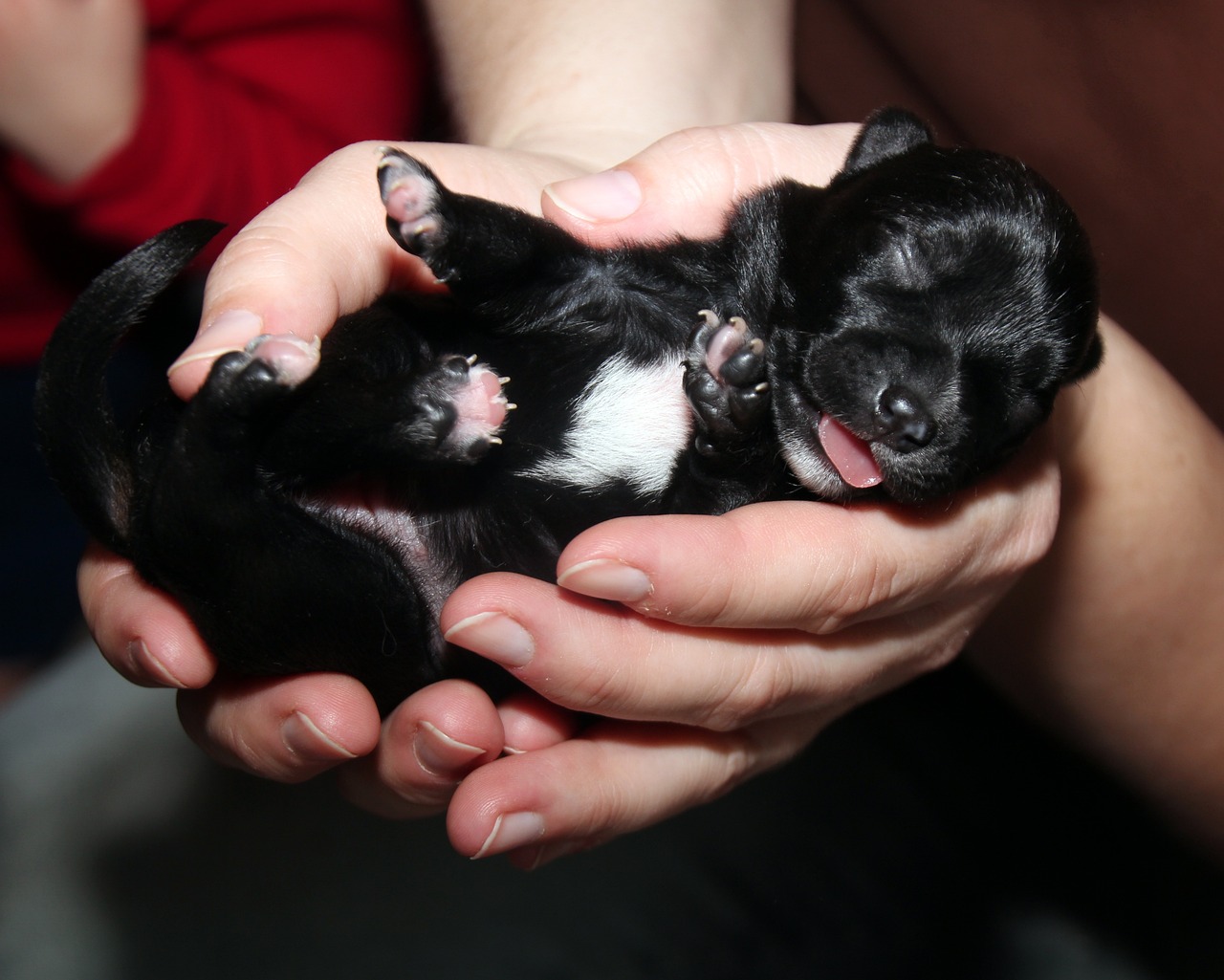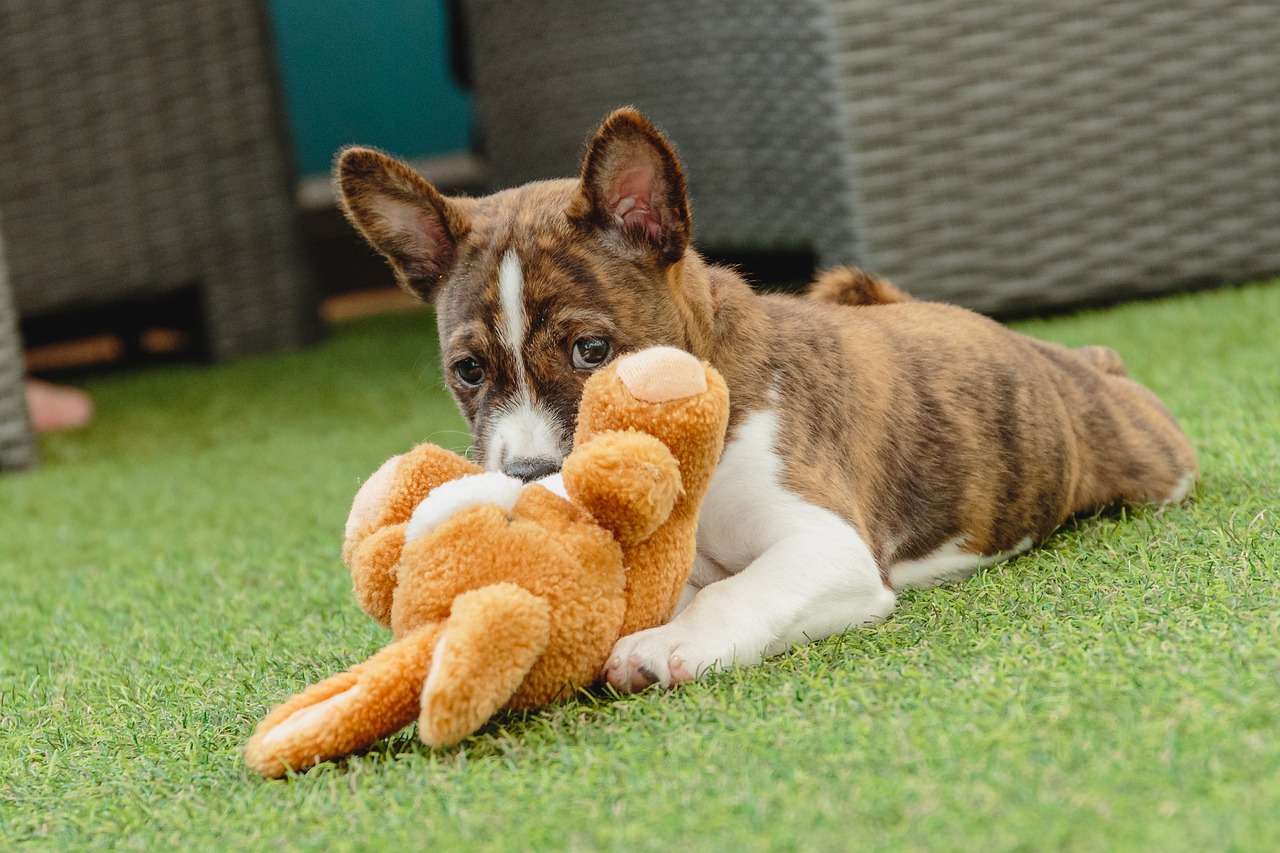Puppy Developmental Stages – Croney Research Group

From the
Croney
Research
Group
A puppy’s early life is a period of rapid physical, sensory, and behavioral development. They quickly attain new skills and abilities. As puppies progress through developmental stages their experience of the world changes.
Understanding how puppies develop, physically and behaviorally, helps you support their welfare. Properly timed socialization and enrichment activities will result in confident puppies. It will also set them up for success as healthy adult dogs.
Note: Age is a helpful starting point for knowing where puppies are developmentally. But behavior is often a better indicator. The rate of development varies by breed and individual.

Early Stages of Development

Neonatal Period (birth - 2 weeks)
Behaviors:
- Sleeping 90% of time
- Nursing
- Dependent on dam
Physical changes:
- Period of rapid growth
What to do:
Begin early handling
-
- Start at 3 days of age
- Hold puppies gently
- Keep sessions short: 30-60 seconds per puppy
- Handle during daily health or weight checks
Transitional Period (~2 - 3 weeks)
Behaviors:
- Interest in littermates begins
- Startle response appears
Physical changes:
- Eyes and ears start opening
- Teeth begin to erupt
- Can crawl backwards and forwards
Sensitive Period for Socialization
The sensitive period (3-14 weeks of age) is when puppies learn what is safe. Experiences at this time leave a lasting impression on puppies. Early life experiences can also affect behavior in adulthood. Socialization sets puppies up for success with people, dogs, and other species. Socialization is lifelong: provide dogs with positive social experiences throughout their lives.
See our handouts Puppy Socialization and Early Exposure for Puppies

What to do:
Begin socialization
- Increase the frequency and duration of gentle handling
- Begin to introduce puppies to new people
- Encourage play with caretakers
- Begin gentle grooming
Begin providing environmental enrichment
- Provide more complex toys like puppy gyms
- Expose puppies to different sounds
- Introduce safe chew items
- Allow puppies to explore outdoors
3 - 4 weeks of age
Behaviors:
- Begin to become more independent from their dam
- Begin to play
- Learning to mouth gently
Physical changes:
- Hearing and vision improve
- Begin to urinate and defecate on their own
- Ability to walk improves and
- Vocalizations now include barking
4 - 7 weeks of age
Behaviors:
- Comfortably explore new items and experiences
- Form attachments to humans
- Develop preferences for where to urinate and defecate
Physical changes:
- Begin weaning and eating solid food
- Senses and coordination continue to improve
7 - 14 weeks of age
Behaviors:
- Increased fear of new things (fear period)
- Short attention span
Physical changes:
- Fully developed vision
- Improved motor skills

Fear Periods
The fear period is a time when puppies are especially sensitive to new objects and experiences. Work to keep experiences positive during this time.
- The first fear period occurs between ~8-10 weeks of age
- Dogs may experience a second fear period between ~6-14 months of age
- Each fear period lasts around 1-3 weeks in duration
Common behaviors displayed include fear of novelty & body language indicating fear or stress
See our handout: Canine Body Language
What to do:
Navigate the fear period
- Avoid potentially scary situations
- Support positive interactions
- Monitor for fearful body language to indicate onset and end of fear period
- Pair new experiences with treats
- Do not force puppies to engage with situations they are afraid of
Continue socialization
- Incorporate time with healthy dogs and puppies from other litters
- Add short training sessions using positive reinforcement
- Provide opportunities for puppies to meet new people
- Join a puppy class
Continue environmental enrichment
- Offer digging boxes
- Introduce stairs
Late Stages of Development

What to do:
Continue socialization
- Positive interactions with other healthy dogs and puppies of various sizes, ages, and breeds.
- Positive interactions with a wide variety of people, including veterinarians.
Continue environmental enrichment
- Offer cognitive challenges such as food puzzles or agility courses
- Take a neighborhood walk, allow for exploration of new places
- Provide positive experiences with a variety of sights, sounds, smells, textures
Juvenile Period (~4 – 6 months of age)
Behaviors:
- Chewing increases
- Sleeping through the night
- Testing physical boundaries
- Some dogs experience regression in training
- Increased excitability, intensity, and energy
Physical changes:
- Growth spurts
- Hormone surges
Adolescent Period (~6 – 24/36 months of age)
Behaviors:
- Begin to alarm bark
Physical changes:
- Sexual maturity (6-24 months)
- Social maturity (12-36 months)
- Skeletal maturity (12-18 months)
- Full control of bladder and bowels
Topic(s): Bare Bones Basics, Breeder Resource, Developmental Stages, Puppy Development